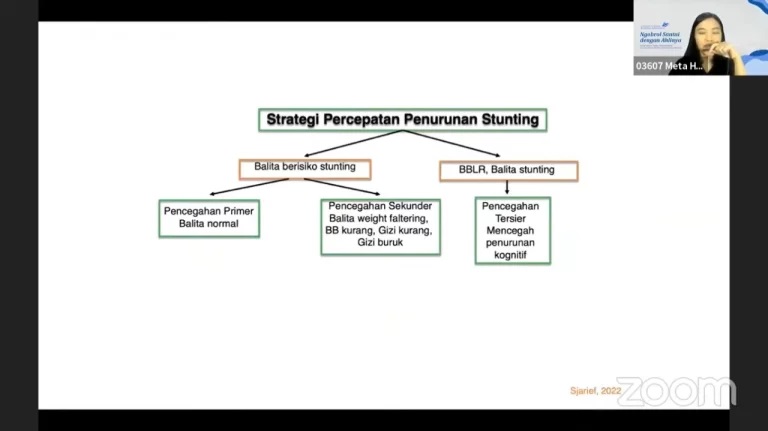

Ksatria Airlangga Floating Hospital (RSTKA) trained volunteers by holding a casual chat seminar entitled Stunting Knowledge Refresher on Saturday (11/11/2023). The seminar took place on the occasion of RSTKA's sixth anniversary as well as briefing volunteers for the Lombok Bakti action.
During the event, Dr. Meta Herdiana Hanindita SpA(K) revealed that the stunting rate among Indonesian toddlers is still high. One in three Indonesian toddlers is stunted which has an impact on their short-term and long-term development.
"In the short term, it can interfere with brain formation. As a result, in the long run, it can reduce IQ. Workers will also have a lower per capita income, their immune system will also be low and they will get sick easily," she said.
Dr. Meta said that toddlers who have contracted stunting will not be able to recover one hundred percent. Thus, preventive measures are the best answer to reduce the risk. She said three preventive measures can be a solution, namely primary, secondary, and tertiary prevention.
Primary Prevention
At this level, families, communities, Integrated service post (Posyandu) nutrition workers, and village midwives can do it. Primary prevention targets normal toddlers who may carry the risk of stunting.
"Normal toddler means normal weight for age, normal length for age, normal weight for length, and normal weight gain," said Dr. Meta.
"If the toddler is all normal," continued Dr. Meta, "then you can continue to complementary food with animal protein at every meal. Don't forget to weigh and measure once a month. If there is a disturbance, you must immediately refer it to the health center."
Secondary Prevention
Secondary prevention is a continuation of primary prevention when toddlers are detected with growth failure, underweight, malnutrition, and malnutrition. According to Dr. Meta, at this stage, Public Medical Centre doctors must immediately detect the presence of the disease and its management.
"If it is indicated, (Public Medical Centre doctors, ed) may provide PDK nutrition therapy or Special Diet Food. PDK is in the form of formula milk with a protein-energy ratio of 10 to 15 percent and sugar content between 5 to 10 percent of total calorie needs," she explained.
"If within one or two weeks it does not improve at the Public Medical Centre level, then it must go to a pediatrician at the Regional General Hospital. Likewise, those who have indicated stunting must refer them to the Regional General Hospital (RSUD)," she said.
Tertiary Prevention
The targets of tertiary prevention are toddlers who have a history of Low Birth Weight (BBLR) or prematurity and stunting itself. This prevention is an advanced action and aims to prevent cognitive decline in toddlers due to stunting.
"If Public Medical Centre doctors can provide PDK, specialist doctors can provide PKMK or Processed Food for Special Medical Purposes. For example, high-calorie milk or milk for LBW (BBLR) and prematurity depending on the condition of each child," she explained.
"So, if the child is already weight faltering, underweight and malnourished or poor, you can't just give him animal protein alone. There must be nutritional therapy to pursue toddler growth," she concluded. (*)
Writer: Muhammad Badrul Anwar
Editor: Nuri Hermawan
Source: unair.ac.id/rstka-bekali-relawan-bakti-dengan-ulas-pencegahan-stunting